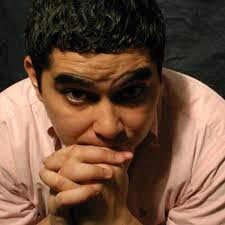
 Before last Sunday’s Superbowl, Chicago theatre fans had another opportunity to watch a live game take place through American Blues Theater’s The Room series. Presented via Zoom, this series showcases new works and those still in development as a means of fundraising until in-person performances are able to safely and feasibly resume. It was, perhaps, inevitable that the performance felt anarchic, but the early look at Kristoffer Diaz’s Football Football Football Football (Or I Love Lave Dash) seemed particularly shaped by this sort of performance.
Before last Sunday’s Superbowl, Chicago theatre fans had another opportunity to watch a live game take place through American Blues Theater’s The Room series. Presented via Zoom, this series showcases new works and those still in development as a means of fundraising until in-person performances are able to safely and feasibly resume. It was, perhaps, inevitable that the performance felt anarchic, but the early look at Kristoffer Diaz’s Football Football Football Football (Or I Love Lave Dash) seemed particularly shaped by this sort of performance.
Football Football is still in development, but the basic outline is thus: an NFL team is eyeing two prospects. One, Lave Dash, is ideal as a celebrity. He is handsome, multiethnic, a scholar, of ambiguous political persuasions, and good on camera. The other, Merv Griffin I, is uncouth and filled with rage the Coach believes is key to actually winning games, or at least, providing the sort of spectacle viewers, in their darkest hearts, really tune in for. But things are more complicated than they seem. Lave has, through much study, mastered the use of operant conditioning to transform himself into an animalistic killer at will. Merv possesses an intuitive understanding of anatomy and violence that allows him to deliver precision strikes designed to cause long-term organ damage guaranteed to prove fatal after a number of months or years of his choosing. When he figures out a way to throat-punch an intern through the computer screen, the team managers spring for both players. But when they collide on the field, they fuse into something quite unexpected, with implications far beyond the field.
Zaniness looks rather different on a Zoom call than on a live stage, and it is likely that if Football Football ever gets produced in a post-pandemic world, it will have a rather different energy from its first incarnation. Diaz is probably best-known to theatre-goers for The Elaborate Entrance of Chad Deity, another high-energy comedic satire focused on performative masculinity. One of the conceits of Football Football is that the cast is entirely female, with the ensemble playing multiple characters, nearly all of whom are male. The close-ups afforded by a webcam allow for this illusion to be played with more nuance than would otherwise be possible, while the limitations of the broadband and built-in laptop microphones add their own layer of comedic mishap. The production may not be polished, but its more conversational sequences seem to be within the realm of an actual Zoom call, with the focus on Diaz’s witty writing and the visuals just slightly askew.
If Football Football is representative, American Blues Theater’s The Room series isn’t just the first showing of plays still being shaped, but a series of one-time looks at adaptations of them for a different medium. The readings are being done once per month, a different play per month, with the next one set for March 26 and 28. Audience participants are able to remain in the meeting for a talk-back, which in this instance, included the author, and the company provides digital programs including dramaturgical essays on its website. Diaz proudly describes Football Football as “big dumb play,” and there are parts of it that are stronger on Zoom than others. But the series’ past offering spanned a variety of genres, each of which have their own developing dynamic in this experimental new medium and may glean unexpected discoveries from a more close-up presentation.
Information about upcoming readings can be found on American Blues Theater. Tickets are pay-what-you-can, with a suggested donation of $10. They may be booked through the website or by calling 773-654-3101, with a link to the meeting being sent to patrons via email one hour before the show.  www.americanbluestheater.com
www.americanbluestheater.com






More Stories
“Antisemitism in France: Past, Present, and Future”- ( a lecture ) story by Julia W. Rath
“Stardust” Reviewed by Jeffrey Leibham
Finding Paul Lisnek